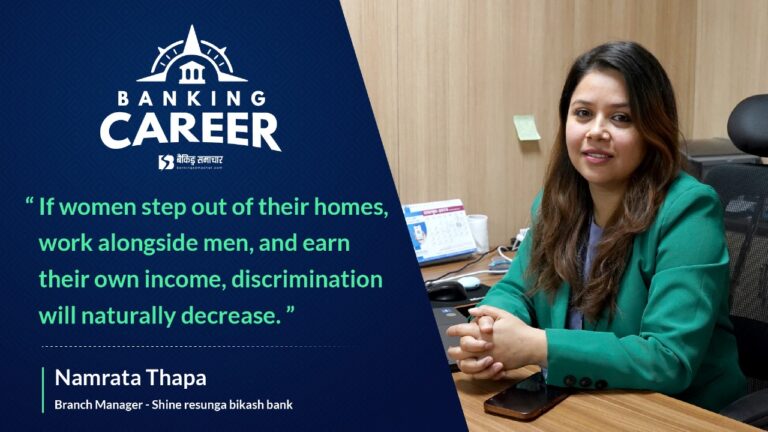Kathmandu: The world, including Nepal, often categorizes individuals based on economic status into upper, middle, and lower classes. These distinctions create a competitive tension between social classes, reflecting broader economic disparities.
Within this societal framework lies the indispensable partnership of men and women, often referred to as the “two wheels of the same chariot.” Despite this analogy, gender inequality persists even in the 21st century, undermining the balance. To combat such inequality, International Women’s Day has been observed since 1911, now in its 113th year, highlighting the ongoing struggle for a more inclusive and equitable world.
Among the countless stories of resilience and success is that of Namrata Thapa, who believes that women who achieve financial and mental independence can rise above societal prejudices. Born into a patriarchal, middle-class family, Namrata grew up witnessing the economic struggles of her father, the sole breadwinner supporting a family of five. Determined to ease this burden, she began tutoring students at the tender age of 13, even while pursuing her own education.
Namrata reflects, “If women step out of their homes, work alongside men, and earn their own income, discrimination will naturally decrease.”
Guided by this mindset, she embarked on a journey of economic independence, which eventually led her to the banking sector at just 19. For the past decade, Namrata has been a dedicated employee of Shine Resunga Development Bank, where she currently heads the deposit collection department.
Her academic journey was equally inspiring. Growing up in Butwal, Namrata excelled in her studies and managed to complete high school on scholarships. She aspired to become a Chartered Accountant (CA) and even passed the entrance exam, but financial constraints forced her to abandon her dream. Instead, she applied for a vacancy at a bank and was selected as a trainee assistant.
“Economic stability is the backbone of life,” Namrata asserts. “In most Nepali families, one person, often the man, earns while the entire family depends on that income. But economic independence is essential for everyone, especially women.”
Namrata’s career in banking began out of necessity. Her father’s health issues and the responsibility of supporting her younger siblings propelled her forward. Over the years, she has worked across various departments and branches, ultimately earning her current leadership role.
Balancing her professional and personal life has been challenging, especially after marriage and motherhood. She acknowledges the difficulty of managing professional responsibilities alongside family duties, particularly after becoming a mother.
“Returning to work after maternity leave is emotionally taxing,” she shares. “Leaving your baby at home can make you question whether to prioritize work or family. But giving up on your career means losing your hard-earned independence.”
Namrata encourages women to persevere, emphasizing the importance of self-motivation and financial independence. “Motivation doesn’t come from outside,” she says. “You have to inspire yourself and educate your family about your work to overcome societal obstacles.”
Despite challenges, Namrata sees her banking career as a pillar of strength, providing her with financial freedom and confidence. She urges women to return to their careers, no matter the obstacles, to ensure they remain self-reliant and empowered.
Namrata Thapa’s story is a powerful reminder that with determination, resilience, and a vision for independence, women can overcome societal barriers and achieve remarkable success.



 About Us
About Us
Comment